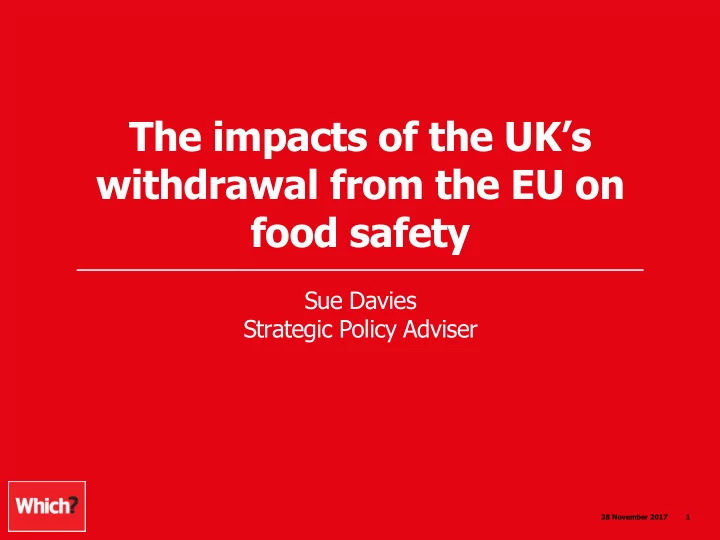

The impacts of the UK’s withdrawal from the EU on food safety Sue Davies Strategic Policy Adviser 28 November 2017 1
The impact of the UK’s withdrawal on food safety Where we are – the current framework and safety Challenges and opportunities Priorities to be addressed 28 November 2017 2
Where we are – the current framework EU approach has evolved (and reflected lessons learned from food scares) General Food Law Regulation (under review), sets out key principles: Responsibilities EU model of risk analysis Independence of risk assessment Role of other legitimate factors Precautionary principle Established the European Food Safety Authority Body of legislation setting out specific requirements sits alongside this – from food additives to GMOs Official Controls Regulation specifies approach by Member States (supported by the Commission) Co-ordination mechanisms in place (eg. RASFF) Common challenges remain across the EU and UK eg. tackling Campylobacter, understanding risks of chemical contaminants Some issues also left unresolved eg. animal cloning. 28 November 2017 3
Opportunities A joined up food and farming policy? Outside of the CAP – can incentives be better aligned across the supply chain? Ensuring that policy better reflects consumer interests? Strengthening standards and protection The EU’s exit means that the enforcement regime needs to be over -hauled and modernised Areas where regulation could be strengthened eg. traceability, labelling. Important to take the opportunity for the UK to compete on the basis of high health, welfare and quality standards Nature of the future relationship and extent of any divergence is currently unclear. 28 November 2017 4
Challenges The UK’s EU Withdrawal Bill will transpose all EU law into UK law, but: Operational aspects need to be resolved as soon as possible: Risk assessment – relationship with EFSA, national capacity? Controls/ enforcement – capacity to conduct import and export checks, including extent of future collaboration (eg. third countries, RASFF) Underlying principles in the Charter of Fundamental Rights and Treaty also need to be transposed eg. precautionary principle, right to a high level of human health and consumer protection. Future UK trade policy UK Government’s commitment that it will promote high standards must be reflected in any trade deals – ensuring that food safety is not “traded away” (along with access to the EU market) Consumer engagement (eg. on acceptability of production methods) also needs to be at the heart of the UK’s future approach. Access and affordability Need to avoid any shocks that will hit consumers hard – and potentially lead to a trading down by both consumers and by food businesses. 28 November 2017 5
Priorities to be addressed Consumer interests need to be put at the heart of the negotiations, future relationship and future trade policy High standards for both UK and EU consumers must be ensured Existing law must be transposed, along with the underlying principles of food law Opportunities should also be taken to strengthen the framework, improve safety and reduce foodborne disease There must be investment in a robust UK enforcement regime Agreement needs to be reached as soon as possible on a future relationship and the extent to which there can be on-going co-operation On-going co-operation is also important at international level eg. Codex, WHO This will be essential in managing the risks of a complex and globalised food supply chain. 28 November 2017 6
Recommend
More recommend